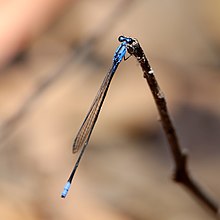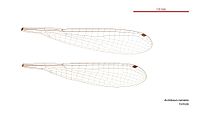Archibasis mimetes
Appearance
(Redirected from Blue-banded longtail)
| Blue-banded longtail | |
|---|---|

| |
| Male, Cairns | |
| Scientific classification | |
| Domain: | Eukaryota |
| Kingdom: | Animalia |
| Phylum: | Arthropoda |
| Class: | Insecta |
| Order: | Odonata |
| Suborder: | Zygoptera |
| Family: | Coenagrionidae |
| Genus: | Archibasis |
| Species: | A. mimetes
|
| Binomial name | |
| Archibasis mimetes | |

| |
Archibasis mimetes is a species of damselfly in the family Coenagrionidae,[3] commonly known as a blue-banded longtail.[4] It is a medium-sized damselfly; the male is bright blue and black.[4] It has been recorded from New Guinea and northern Australia,[5] where it inhabits streams.[6]
Etymology
[edit]The species name mimetes is from a Greek word meaning imitative. Robin Tillyard named this species of damselfly after its close resemblance to Pseudagrion australasiae.[2][7]
Gallery
[edit]-
Egg-laying
-
Male
-
Male
-
Male
-
Male
-
Female wings
-
Male wings
See also
[edit]References
[edit]Wikimedia Commons has media related to Archibasis mimetes.
- ^ Dow, R.A. (2017). "Archibasis mimetes". IUCN Red List of Threatened Species. 2017. IUCN: e.T87533313A87534071. doi:10.2305/IUCN.UK.2017-1.RLTS.T87533313A87534071.en.
- ^ a b Tillyard, R.J. (1913). "On some new and rare Australian Agrionidae (Odonata)". Proceedings of the Linnean Society of New South Wales. 37 (1912): 404–479 [472]. doi:10.5962/bhl.part.22352 – via Biodiversity Heritage Library.
- ^ "Species Archibasis mimetes (Tillyard, 1913)". Australian Faunal Directory. Australian Biological Resources Study. 2012. Retrieved 6 April 2017.
- ^ a b Theischinger, Günther; Hawking, John (2006). The Complete Field Guide to Dragonflies of Australia. Collingwood, Victoria, Australia: CSIRO Publishing. p. 82. ISBN 978-0-64309-073-6.
- ^ Watson, J.A.L.; Theischinger, G.; Abbey, H.M. (1991). The Australian Dragonflies: A Guide to the Identification, Distributions and Habitats of Australian Odonata. Melbourne: CSIRO. ISBN 0643051368.
- ^ Theischinger, Gunther; Endersby, Ian (2009). Identification Guide to the Australian Odonata (PDF). Department of Environment, Climate Change and Water NSW. p. 194. ISBN 978-1-74232-475-3.
- ^ Endersby, Ian (2012). "Etymology of the Dragonflies (Insecta: Odonata) named by R.J. Tillyard, F.R.S." Proceedings of the Linnean Society of New South Wales. 134: 1–16.








